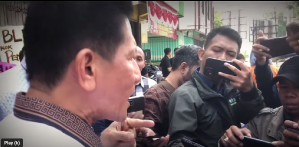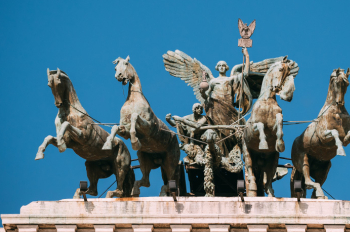
About 50 officials from Jombang Regency, Indonesia on Aug. 18 dragged a pastor from his worship site and sealed the shop where his church met, sources said.
The sealing of the worship site was part of a Jombang government effort to recover dozens of shops the government says it owns at a business compound in the Weru area of Mojongapit village, East Java Province.
Pastor Herri Soesanto described the government seizure of the two-story shop-house used by his Good God Church (Gereja Gembala Baik, or GAB) in the Simpang Tiga Shopping Compound, about 80 kilometers (50 miles) west of Surabaya, as “violent and anarchic.”
“I was harassed and dragged by a mob that I estimated was about 50 people,” Pastor Herri said in a podcast interview with Gus Aan Anshori, son of a leading Muslim cleric. “What was disappointing was those people who closed my church were my friends.”
Displaying the nearly healed bruises on his hands from the mob pulling him, Pastor Herri said, “This is the anarchic act that embarrasses the city of Jombang. The city of Jombang is wise. But the regent’s actions are violent and anarchic.”
The church closure took place under acting Jombang Regent Teguh Narutomo, he said.
“I never imagined the violence that government officials made, causing upset among the congregation,” said Pastor Herri, adding that he was threatened with jail.
Ownership
Officers also closed dozens of shops in the business compound on claims that the land belonged to the city government.
Responding to Gus Aan Anshori’s question about the status of the shop-house, Pastor Herri said that when he and other shop-house owners purchased their sites, the real estate company did not inform them that it was working with the Jombang local government to develop the business compound.
“The developer did not tell us about that at all,” he said, adding that they had a 2016 building-use rights certificate that they continued using even though it expired in 2016, as it is common in Indonesia to postpone legalities as long as payments are made.
The church tried to extend the validity period of the building-use rights certificate, but officials denied it, instead demanding that they pay rent and back-rent, he said.
“In 2022, the local government asked us buyers to pay the rent from 2016 to 2021, with a payment of 19,105,000 rupiah [1,228 USD] per year,” he said.
Thus, although the church had bought the property and paid land and building taxes without the developer telling them about the joint plans with the government to develop it, the developers and officials demanded they pay rent, he said.
The church carried out worship services on the front porch of the sealed-off site on Aug. 18 and Aug. 25, where congregation member Anania Budi Yanuari Hidayat spoke to media outlet KBR.
“Of course, as believers we feel hurt, shocked, feel like stepchildren, feel like our wealth is worthless in their eyes,” said Anania told KBR on Aug. 25, adding that there are hopes the Jombang local government will reconsider and let the congregation hold activities at the site.
Pastor Herri said there has been no solution to the problem.
“What is the government’s attitude towards religious tolerance if the church is closed now?” he said. “I ask for the wisdom of the Jombang Regency government. What will happen to our congregation?”
Jombang officials said the sealing of the church was necessary to secure local government land.
“What is clear is that we secured the place,” a high-ranking Jombang official identified only as Syaiful told KBR on Aug. 26. “We secured the shop-house assets. If it is used as a place of worship, then it is automatically beyond our power. That is a shop-house for business. We consider it as a shop-house. We did not consider it the place of worship.”
Saying the seizure was legal, Syaiful said those who object can take legal action. Even so, the Jombang Regency government promised to find a solution for the congregation, according to KBR.
Ilham Rohim, an official at the Jombang Ministry of Religious Affairs Office, added that the church has never applied for a license to use the site for worship, according to Jatimnews.com.
The Anti-Discrimination Islamic Network (JIAD) coordinator asked the local government to help provide the congregation a place of worship. The Coordinator of the East Java JIAD, Aan Anshori, said that officials could provide a place for worship until the congregation finds a permanent location.
Muslims account for 83.3 percent of Indonesia’s population, while 11.43 percent identify as Christian, with the evangelical population estimated at 3.23 percent, according to the Joshua Project.
Indonesia ranked 42nd on Christian support organization Open Doors’ 2024 World Watch List of the 50 countries where it is most difficult to be a Christian. Indonesian society has adopted a more conservative Islamic character, and churches involved in evangelistic outreach are at risk of being targeted by Islamic extremist groups, according to the WWL report.
© 2023 Morning Star News. Articles/photos may be reprinted with credit to Morning Star News. https://morningstarnews.org. Morning Star News is a 501(c)(3) non-profit corporation that relies solely on contributions to offer original news reports of persecuted Christians. By providing reliable news on the suffering church, Morning Star News’ mission is to empower those in the free world to help and to encourage persecuted Christians that they are not forgotten or alone.





